
Steven Karl Zoltán Brust is an American fantasy and science fiction author of Hungarian descent. He is best known for his series of novels about the assassin Vlad Taltos, one of a disdained minority group of humans living on a world called Dragaera. His recent novels also include The Incrementalists (2013) and its sequel The Skill of Our Hands (2017), with co-author Skyler White.

Teresa Nielsen Hayden is an American science fiction editor, fanzine writer, essayist, and workshop instructor. She is a consulting editor for Tor Books and is well known for her weblog, Making Light. She has also worked for Federated Media Publishing, when in 2007 she was hired to revive the comment section for the blog Boing Boing. Nielsen Hayden has been nominated for Hugo Awards five times.

Dzur is a fantasy novel by American writer Steven Brust, the tenth book of the Vlad Taltos series, originally published in 2006 by Tor Books. It takes place immediately after Issola, the previous novel. The novel was originally intended to be called Tiassa, after another Dragaeran House. The book entered The New York Times Bestseller list for Hardcover Fiction on August 22, 2006.

Teckla is a fantasy novel by American writer Steven Brust, the third book in his Vlad Taltos series. Originally printed in 1987 by Ace Books, it was reprinted in 1999 in the omnibus The Book of Jhereg along with Jhereg and Yendi. Following the trend of the Vlad Taltos books, it is named after one of the Great Houses in Brust's fantasy world of Dragaera and features that House as an important element to its plot.

Jhereg is a fantasy novel by American writer Steven Brust, part of his Vlad Taltos series, originally published in 1983 by Ace Books. Ace later republished it in 1999 as part of the three-book omnibus, The Book of Jhereg. Marvel Comics adapted the story into a graphic novel titled Steven Brust's JHEREG in 1987.

Yendi is a fantasy novel by American writer Steven Brust, the second book in his Vlad Taltos series; it is a prequel to the first novel, Jhereg. Originally printed in 1984 by Ace Books, it was reprinted in 1999 in the omnibus The Book of Jhereg along with Jhereg and Teckla. Following the trend of the Vlad Taltos books, it is named after one of the Great Houses in Brust's world of Dragaera and features that House as an important element to its plot. Yendi is Brust's least favorite book.
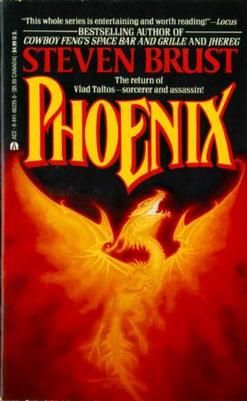
Phoenix is a fantasy novel by American writer Steven Brust, the fifth book in his Vlad Taltos series, set in the fantasy world of Dragaera. Originally published in 1990 by Ace Books, it was reprinted in 2002 along with Taltos in the omnibus The Book of Taltos. Following the trend of the Vlad Taltos books, it is named after one of the Great Houses and features that house as an important element to its plot.
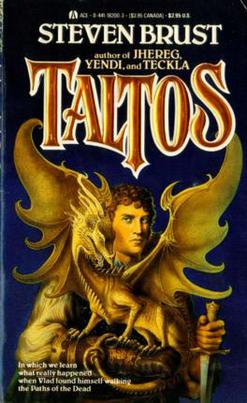
Taltos is a fantasy novel by American writer Steven Brust, the fourth book in his Vlad Taltos series, set in the fantasy world of Dragaera. Originally published in 1988 by Ace Books, it was reprinted in 2002 along with Phoenix as part of the omnibus The Book of Taltos. It does not follow the trend of being named after one of the Great Houses of the Dragaeran Empire, and instead takes its title from its protagonist. Due to the series being written out of chronological order, the events of this book are actually the earliest in the series' timeline.
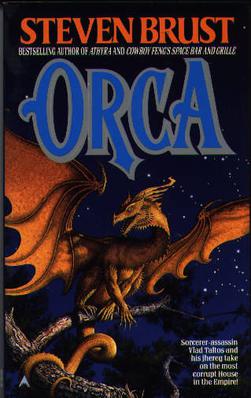
Orca is a fantasy novel by American writer Steven Brust, the seventh book in his Vlad Taltos series, set in the fantasy world of Dragaera. Originally published in 1996 by Ace Books, it was republished in 2003 along with Athyra in the omnibus The Book of Athyra. Following the trend of the Vlad Taltos books, it is named after one of the Great Houses and features that House as an important element to its plot.
The Khaavren Romances are a series of fantasy novels written by Steven Brust and set in the fictional world of Dragaera. The novels are swashbuckling adventure stories involving war, intrigue, and romance. They are heavily influenced by and homage the d'Artagnan Romances written by Alexandre Dumas. The series is written by Brust in the voice and persona of a Dragaeran novelist, Paarfi of Roundwood, whose style is a tongue-in-cheek parody of Dumas, matching both his swashbuckling sense of adventure and his penchant for tangents and longwindedness. The Khaavren Romances books have all used Dumas novels as their chief inspiration, recasting the plots of those novels to fit within Brust's established world of Dragaera. The first five books in the cycle are inspired by the Musketeers books, while 2020's The Baron of Magister Valley uses The Count of Monte Cristo as a starting point.
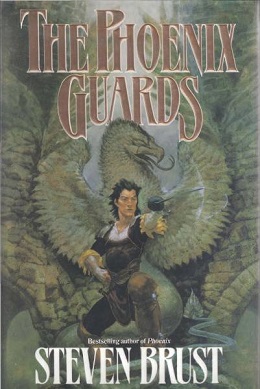
The Phoenix Guards is a fantasy novel by American writer Steven Brust, the first novel in the Khaavren Romances series, set in the fictional world of Dragaera. Like the other books in that series, the novel is heavily influenced by the d'Artagnan Romances written by Alexandre Dumas, and is written by Brust in the voice and persona of a Dragaeran novelist, Paarfi of Roundwood, whose style is a tongue-in-cheek parody of Dumas, matching both his swashbuckling sense of adventure and his penchant for tangents and longwindedness. Brust describes the book as "a blatant ripoff of The Three Musketeers." The Khaavren Romances books have all used Dumas novels as their chief inspiration, recasting the plots of those novels to fit within Brust's established world of Dragaera. The next several books in the cycle are inspired by the subsequent Musketeers books, while 2020's The Baron of Magister Valley uses The Count of Monte Cristo as a starting point.
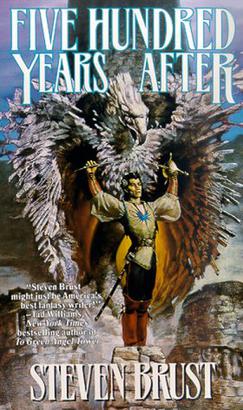
Five Hundred Years After is a fantasy novel by American writer Steven Brust, the second novel in the Khaavren Romances series. It is set in the fantasy world of Dragaera. Like the other books in that series, the novel is heavily influenced by the d'Artagnan Romances written by Alexandre Dumas, and is written by Brust in the voice and persona of a Dragaeran novelist, Paarfi of Roundwood, whose style is a tongue-in-cheek parody of Dumas, matching both his swashbuckling sense of adventure and his penchant for tangents and longwindedness. The title of Five Hundred Years After corresponds with the second Musketeer novel, Twenty Years After. The Khaavren Romances books have all used Dumas novels as their chief inspiration, recasting the plots of those novels to fit within Brust's established world of Dragaera. The first five books in the cycle are inspired by the Musketeers books, while 2020's The Baron of Magister Valley uses The Count of Monte Cristo as a starting point.
The Viscount of Adrilankha is a fantasy novel by American writer Steven Brust, published in three volumes. Collectively, the three books form the third novel in the Khaavren Romances series. It is set in the fantasy world of Dragaera. Like the other books in the series, the novel is heavily influenced by and homages the d'Artagnan Romances written by Alexandre Dumas, and is written by Brust in the voice and persona of a Dragaeran novelist, Paarfi of Roundwood, whose style is a tongue-in-cheek parody of Dumas, matching both his swashbuckling sense of adventure and his penchant for tangents and longwindedness. The book's format and title correspond with The Vicomte de Bragelonne, the multi-volume third book of the d'Artagnan Romances. The Khaavren Romances books have all used Dumas novels as their chief inspiration, recasting the plots of those novels to fit within Brust's established world of Dragaera. The first five books in the cycle are inspired by the Musketeers books, while 2020's The Baron of Magister Valley uses The Count of Monte Cristo as a starting point.

Jhegaala is a fantasy novel by American writer Steven Brust, the eleventh book in his Vlad Taltos series, set in the fantasy world of Dragaera. It was published in 2008. Following the trend of the series, it is named after one of the Great Houses and usually features that House as an important element to its plot.

Iorich is a fantasy novel by American writer Steven Brust, the twelfth book in his Vlad Taltos series, set in the fantasy world of Dragaera. It was published in 2010. Following the trend of the series, it is named after one of the Great Houses and usually features that House as an important element to its plot. The Iorich are renowned for their quest for justice and the rules of law. Initially released in hardcover, rather than being followed by a normal mass-market paperback, a trade paperback was released.

Tiassa is the thirteenth book in Steven Brust's Vlad Taltos series, set in the fantasy world of Dragaera. It was published in 2011. Following the trend of the series, it is named after one of the Great Houses and features that House as an important element to its plot.
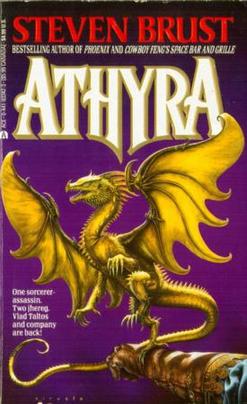
Athyra is a fantasy novel by American writer Steven Brust, the sixth book in his Vlad Taltos series, set in the fantasy world of Dragaera. Originally published in 1993, by Ace Books, it was reprinted in 2003 along with Orca in the omnibus The Book of Athyra. Following the trend of the Vlad Taltos books, it is named after one of the Great Houses and features that House as an important element to its plot.

Hawk is the fourteenth book in Steven Brust's Vlad Taltos series, set in the fantasy world of Dragaera. It was published in 2014. Following the trend of the series, it is named after one of the Great Houses, and the personality characteristics associated with that House are integral to its plot.

Vallista is the fifteenth book in Steven Brust's Vlad Taltos series, set in the fantasy world of Dragaera. It was released in October 2017. Following the trend of the series, it is named after one of the Great Houses, and the personality characteristics associated with that House are integral to its plot.

















